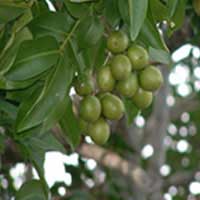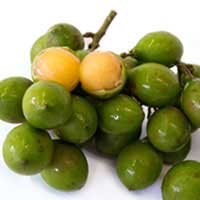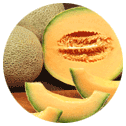 Full List of Fruits
Full List of Fruits  Spanish lime
Spanish limeSpanish lime
Scientific name - Melicoccus bijugatus
The Spanish lime originates from the north part of South America and grows naturally in the coasts and also in the dry forests of Central America and also in the Caribbean. The Spanish lime has two tastes known to be sweet and also sour sometimes, Mostly in the southern parts of Mexico they are consumed along with chili powder, salt and also lime, The sweet type of the fruit is preferably ate as it is without any ingredients. The fruit is found to be a mixture of lychee and also lime, contains a firm, delicate and has a hard layer which are ate by splitting it up with the help of the teeth which is historically followed.
![]() Nutritional Value of Spanish lime
Nutritional Value of Spanish lime
| Amount Per Serving | ||
| Calories | 58 | |
| Calories from Fat | 0 | |
| % Daily Value* | ||
| Total Fat | 0.1 g | 0 % |
| Saturated Fat | 0 g | 0 % |
| Trans Fat | 0 g | |
| Cholesterol | 0 mg | 0 % |
| Sodium | 0 mg | 0 % |
| Total Carbohydrate | 14 g | 5 % |
| Dietary Fiber | 0 g | 0 % |
| Protein | < 1 g | 1 % |
In the United States they are commonly referred to as the Spanish Limes because they are similar to a small sized limes which are unripe. They are found to be in groups and are also sold in clusters only, the skin is soft and has a leathery texture , their flesh commonly known as aril is jelly-like, shines from within and has a look alike appearance of lychee, the aril seems to be very colorfull with a pulp enclosing the seeds of the fruit. The aril is found in many colors such as orange and yellow, has both sweet and sour flavors, after the fruit ripens the flesh brings in some acidic and sweet taste combined together which is brought into a comparison of the lime and lychee combination.
These Mamoncillo’s can be either taken raw or else used in the preparation of beverages, desserts and also jellies, for eating the fruit one must bite out the thinner part of the skin and peel them off to obtain a glittering pulp. An apt way to consume the fruit is by putting the entire fruit into the month and to separate the pulp from the seed and discard the seeds. A simple syrup made out of the Mamoncillo helps in the preparation of deserts and also some drinks, in the country of Ecuador these fruits are taken along with salt and chili, Beware of staining while eating this fruit.
![]() Health Benefits of Spanish lime
Health Benefits of Spanish lime
The Spanish Lime is rich in fiber thus helps in the reduction of cholesterol and thus avoiding constipation. The Vitamin A contents of the fruit helps in strengthening the immune system and arrests the formation of the urinary stones; The Vitamin C in the fruit is a prominent one and has a good amount of antioxidant properties; the calcium content helps in keeping the teeth and also the bones healthier and also combats cancer; phosphorous contents helps in digestion and balancing the hormone levels in the body. The fruit aids in the reduction of blood pressure and also solves the complications of asthma, since the fruit contains a lot of antioxidant properties known to be the Phenolic Compounds helping in avoiding the cardiovascular disease, strengthens the immune system thus combats the strokes.
The fruits are both domesticated and also naturally grow in many countries; additively they also grow in the coasts of Ecuador, the lowlands in Central America, West Indies and also in Bahamas. The fruits are mostly found in groups of twelve and even more originating from a single stem. The fruit resembles a big green olive in their shape and size, the outer part of the pulp is hardy and is fragile in nature. They can be easily peeled off containing a color between pink and a cream like color helps in preparing a tasty sweet meat. They also aid in serving along with lime and also offered as a snack which is ate by hand. The fruit resembles lychee, both these fruits are from the same family. Lychees are also eaten in the same way; their seeds can be consumed by roasting them like sunflower seeds and like chestnuts.


















